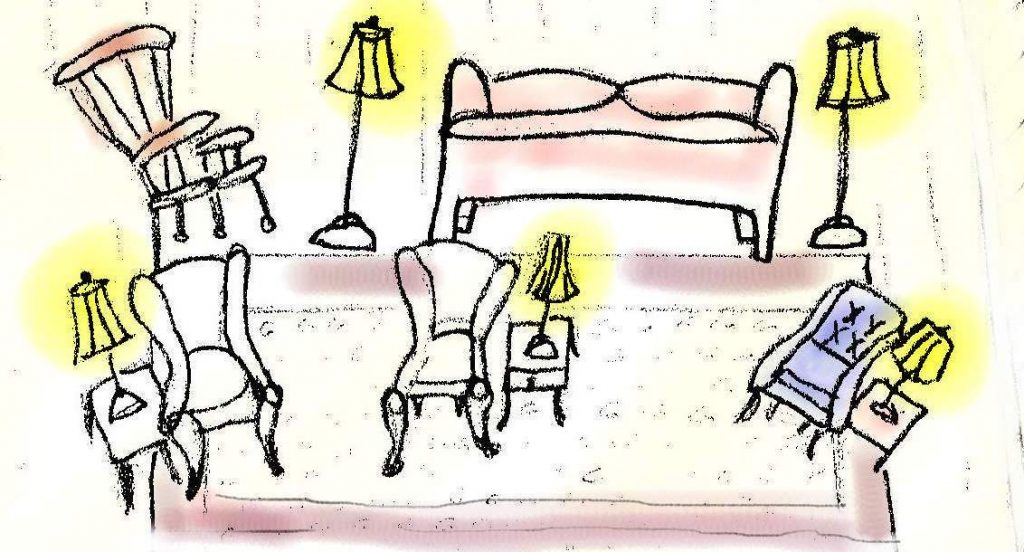Now, to Mathilda, tea in the staff sitting room seemed a great treat; a welcome opportunity to enjoy a quiet respite in a genteel atmosphere away from the heat and bustle of the kitchen. But to Charles, this just felt like yet another banishment.
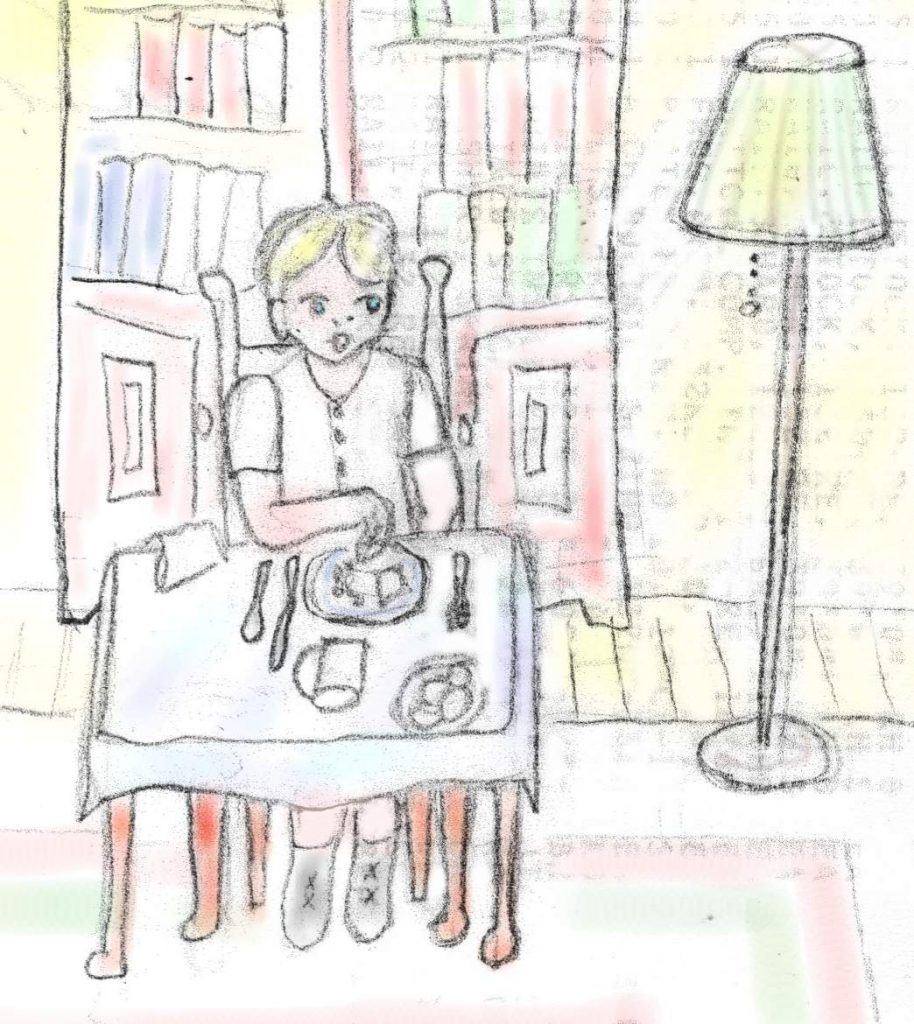
Sitting alone at a little table with only the stern-faced Marie for company did not sound to Charles like something he would “get to” do, but rather something he would “have to” put up with.
In those days in households like the one on the knoll, that had more than a few servants, very small children had their meals separate from the adult members of the family. If there were a nanny, young charges would have their meals with her. She would begin instructing them at an early age in proper etiquette. To prepare for the introduction into formal dining with the adult members of the family, a young lady or gentleman must be trained in the proficient use of any number of pieces of silver flatware, not to mention a variety of crystal and china. They were also expected to be able to join in discussions of current events or light small talk, a fine art that for some is most difficult to master.
Once grown beyond the tutelage of the nanny, these expectations were continued through extensive classes and training at a military school or other preparatory school like the one Charles was soon destined to attend. Charles’ nanny had been dismissed recently, as his father deemed the separation necessary for his maturation before entering military academy.
These days Charles was allowed to join the staff in the kitchen occasionally, but more often than he would have preferred, Charles was required to eat his meals under the watchful eye of Marie, the upstairs parlor maid. The meals were rarely a relaxing affair, but more of an ordeal, as Marie was quick with regular admonishments to “sit up straight”, or “keep your elbows off the table and your serviette in your lap!” or, “No, Master Charles, the soup spoon! and don’t slurp!”
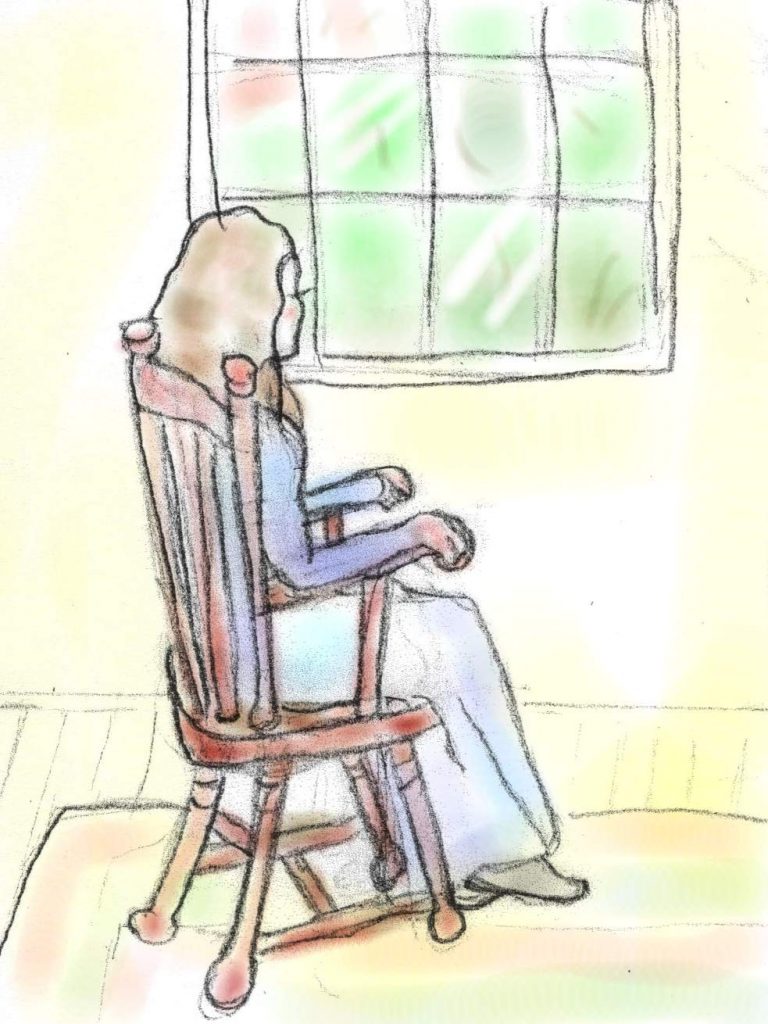
After a barrage of such reminders, he was invariably left to finish his meal alone, as Marie was wont to take herself elsewhere to sit staring wanly out the window, daydreaming of romantic interludes with some imaginary young Lochinvar or another. It seems that Alice was not the only one with amorous, romantic notions.

On this particular day, when Charles entered the staff parlor, Marie had already finished her own tea and seemed in a great hurry.
“Master Charles, where have you been this half hour? Your luncheon is getting cold, lad, and I must get back to work!”
Tucking her hair into her cap and tying her apron around her waist she picked up her feather duster and scurried out of the room, calling over her shoulder as she left, “And don’t think you needn’t mind your manners just because I’m not here to watch over you, laddie. Elbows off the table!” And off she hurried, leaving Charles alone yet again to sit and stare at his cold lunch.
Charles, looking glum, pushed a few peas around on his plate. What was the point of manners anyway? It seemed to him, no matter what he did, he could never get them right.
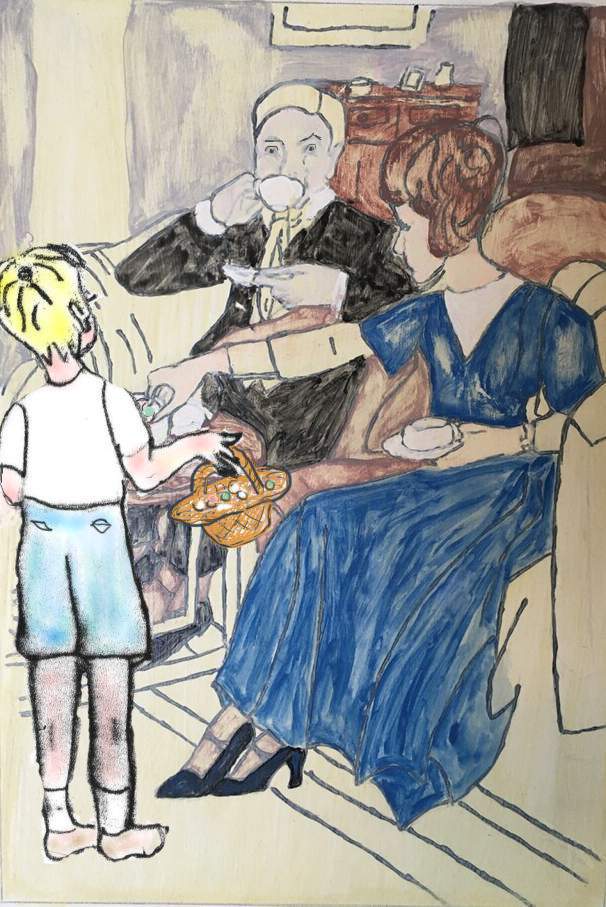
Charles remembered the time, at an afternoon tea that his mother was hosting, when she gave him a tiny gold mesh basket to pass around to the guests. It was filled with lovely pink, white and green melt-in-your-mouth mints. Charles was so very proud to be appointed by his mother to carry out this very special task.
He very carefully began to hand pick each and every candy mint to hand out to each and every guest. His pride soon turned to dejection, as his mother felt it necessary to admonish and correct him most emphatically that this was the wrong way to serve her guests at such a formal gathering. She went on to instruct him to offer the basket to each guest to help him or herself, and to remember that one should never touch any food that he served to others.
Charles sometimes felt that he would never learn all the ins and outs of correct behavior or ever be able to join the polite society of the adult world. He thought he would rather just watch from a distance like he sometimes did when his parents were hosting a ball or evening soiree. On those occasions he was allowed to stay up late in his nightwear and sit on the top step to watch the arrival of his parents’ guests. He would lean his head on the stair spindles and peer through.
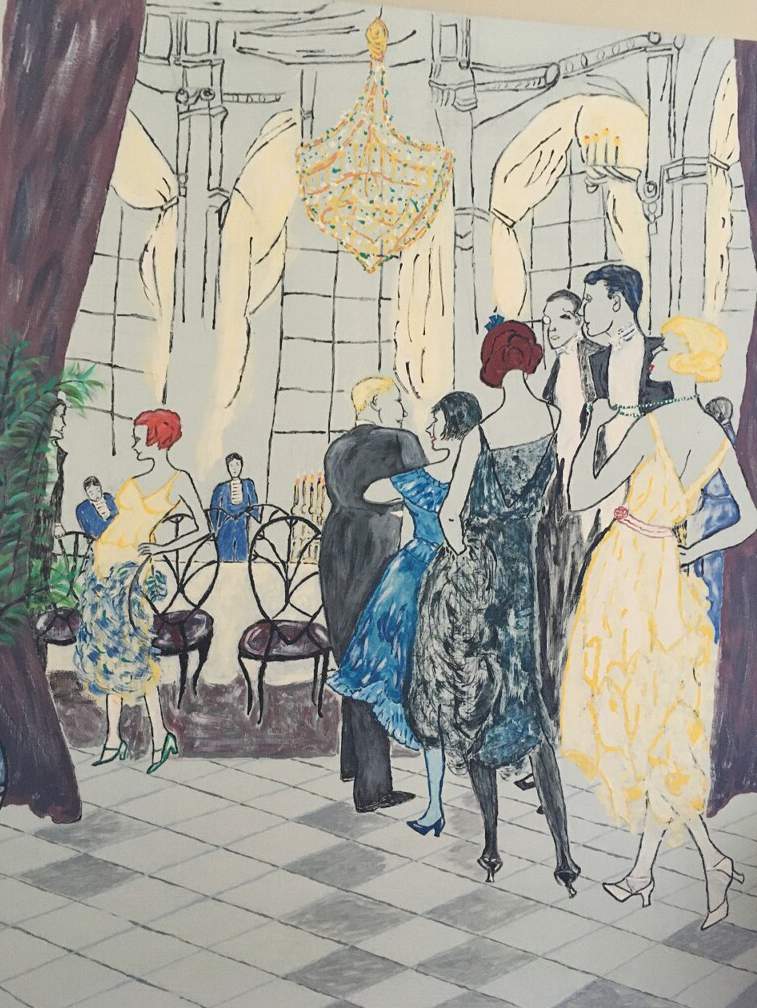
As he looked down at the main, great entrance hall he wondered at the brilliant candles and luxurious finery of the handsome couples as they entered. To him it looked like the room had been transformed into a sparkling wonderland.
Even with such a diverting spectacle, sleep usually overtook him long before the last guest arrived; whereupon, Andrews would carry him off to his bed.
Having been unable to satisfy his appetite for company that day, his disappointment left him with no appetite for food either. Left to fend for himself, Charles rose morosely from his little table, leaving his food untouched and even his treat from Alice forlornly abandoned beside his plate.
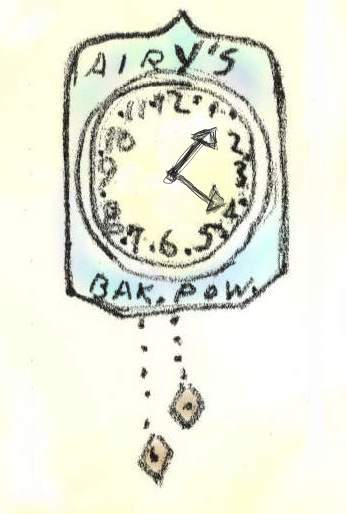
Each and every day, after Charles had exhausted all of his endeavors to seek out diversion and companionship, his destination almost invariably ended in his most favorite haunt of all his repertoire–the library. Today was no exception.
Charles’ great grandfather, who many years ago had the house built for himself, his family and their progeny, had included as part of the plan a spacious library with a high vaulted ceiling. Mullioned windows, reaching almost floor to ceiling graced the west wall. Early afternoon sunlight shone through these windows creating a phenomenal spectacle of reflected colored patterns on the hardwood flooring in the center of the room.
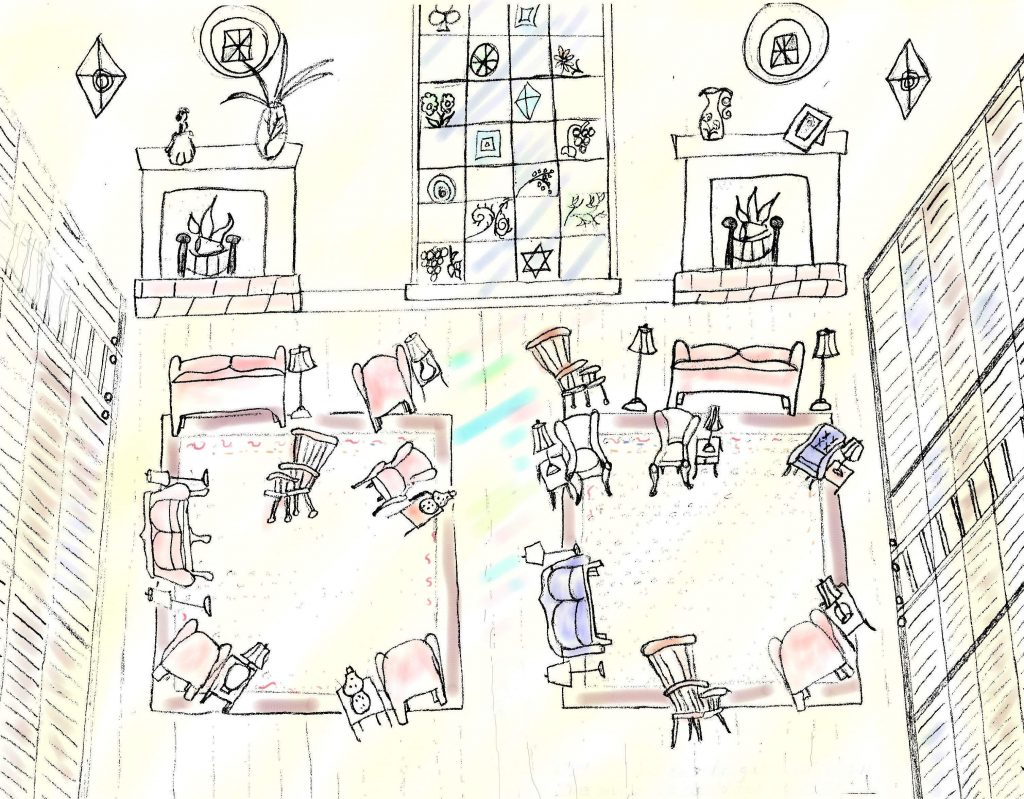
Here and there were smaller windows with inlaid stained glass of many jewel-like colors that seemed to replicate some beautiful distant foreign cathedral.
The remaining sides of the library were divided into two carpeted areas delineated by Persian rugs in rich multicolored hues. These carpets, being quite old, had suffered much wear over the years and had to be rewoven time and again. The library’s furnishings included leather couches and dark brocade wing-back chairs with accompanying lamps and side tables, arranged around cozy fireplaces. All of these furnishings, along with many of the other household amenities, had been imported by Charles’ great grandfather from all over Europe and Asia, making the house on the knoll one of the grandest homes far and wide.
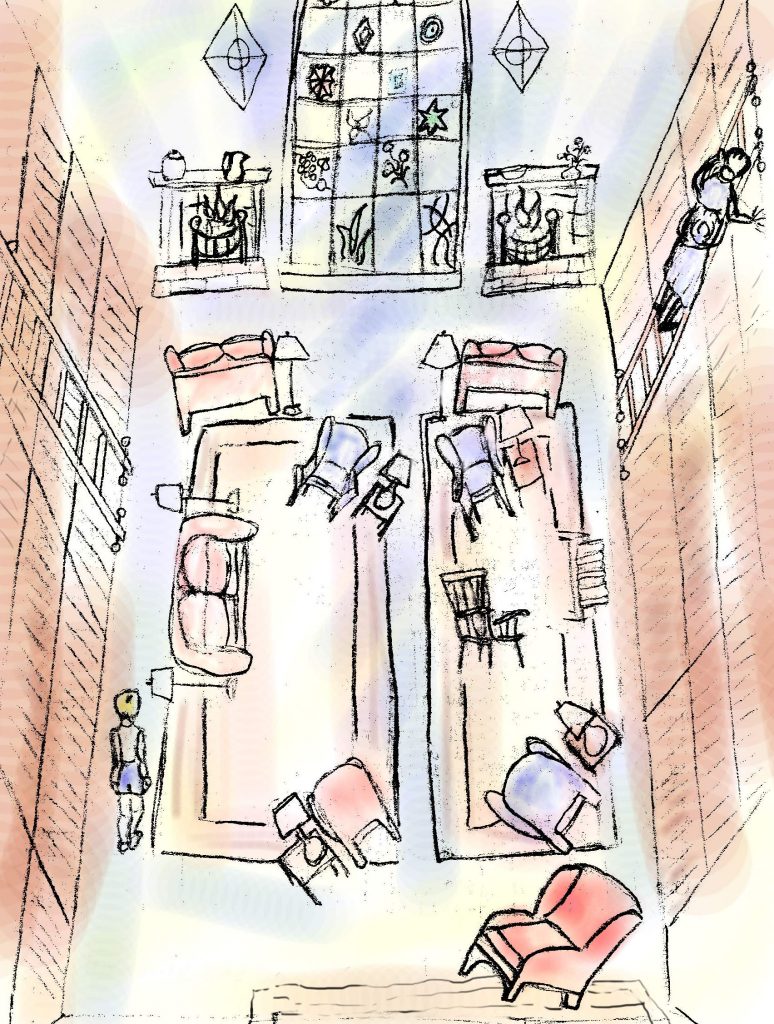
As Charles was not allowed into these two carpeted side areas of the library, he was provided with an adult-sized, over-stuffed, plush wing-chair for his own private use. This chair was conveniently placed near his own set of bookshelves close to the library’s entrance.
It was with this cozy nook in mind that Charles began to climb the servants’ stairs up to the main living quarters, then made his way up the long curving staircase. As he ventured along the upstairs hall, he could hear the echo of his own footsteps. Upon reaching the library, he opened the door and entered. The abrupt sound of a voice, with no visible means of support intruded on his solitude. Though he cast his gaze all about the room, he could see no one. This eerie disembodied voice startled Charles to the point that he was about to retreat when he heard, “Here now, Master Charles, you’re right in the way with your interruptions, as usual.”
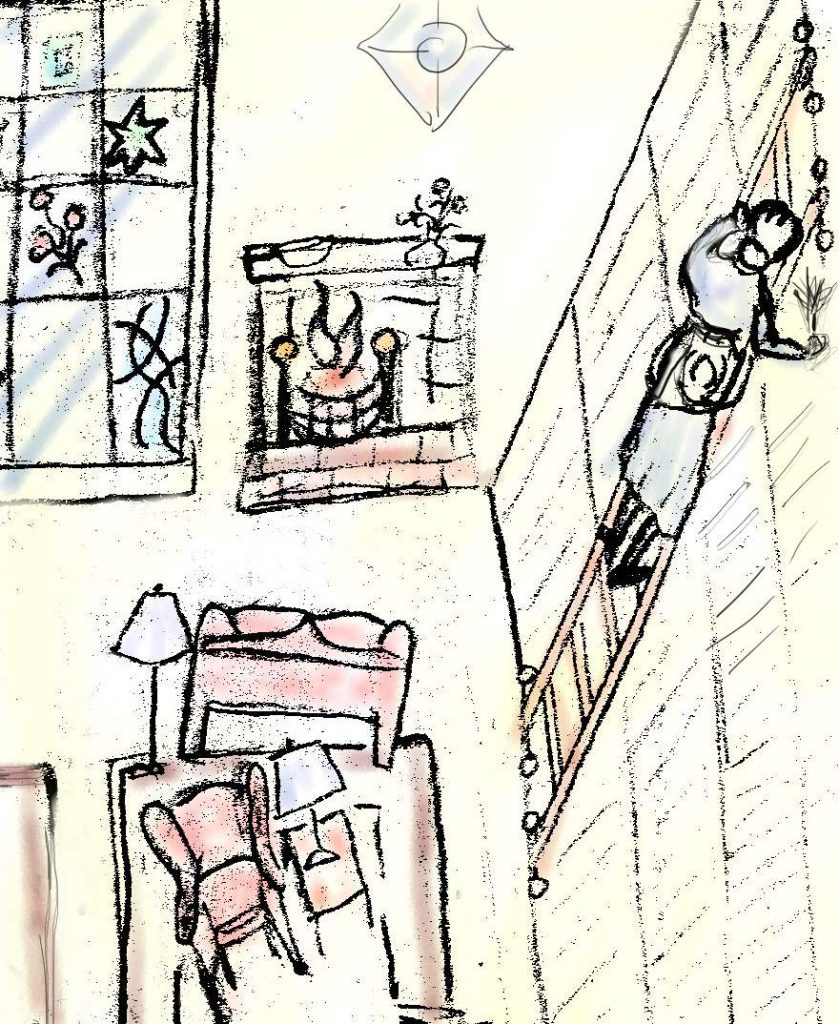
The voice seemed to be coming from everywhere and nowhere. Seeing Charles’ look of confusion she called, “Oop here, laddie.” Charles raised his gaze to the direction of the second remonstrance to see Marie, the upstairs parlor maid, high up on the sliding ladder dusting books on a shelf.
“It joost might reen at any time this afternoon, yee know,” she continued in her Scottish brogue, “So yee best be gettin’ out for some fresh air whilst ye may as yee’ll proobably be needin’ to bide indoors the whole afternoon long, once the poor weather starts. So be off with yee now, there’s a good laddie, so Marie can get on with her tasks.”
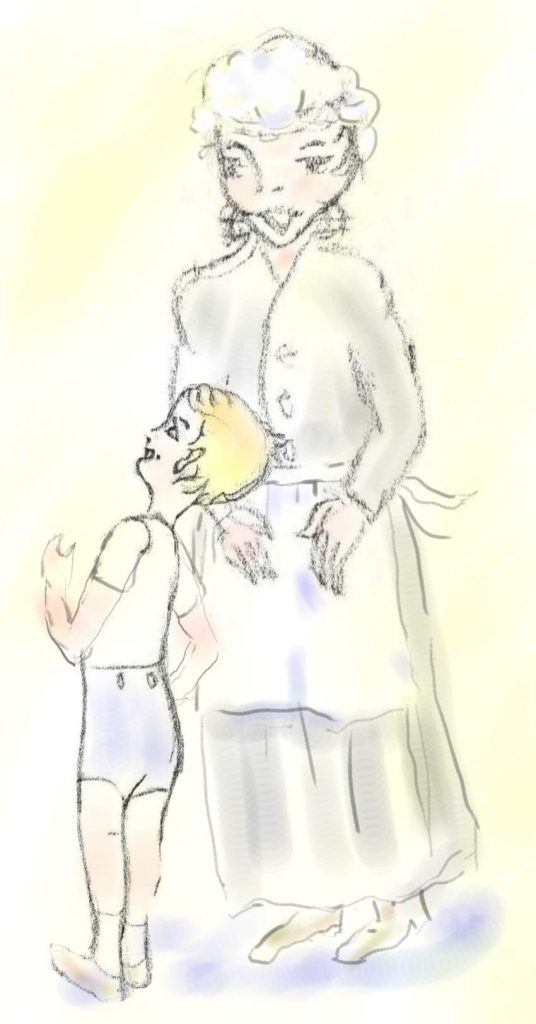
And with this last remark, she came quickly down the ladder to stand over him. With an authoritative nudge of her hand to the middle of his back, she coaxed him ever so gently, but firmly toward the door, steering him back into the hall, and with finality, closed the door after him.
He could still hear the clicking of her tongue and scolding under her breath from behind the closed door. But shortly thereafter, he began to hear a familiar unpleasant sound of high-pitched squeals emanating from the library.
You see, Marie, of the usual dour expression, was happiest when at work and would set to singing (some might call it screeching) to herself. Everyone in the household knew that Marie could not carry a tune, even if it was handed to her in a basket. Everyone except Marie, that is. She would shriek away in her high-pitched voice, “On the brrrawny, brrriney, BRRRRRAAAEE! Of the brrrrinny, brrrriney sea-eeeee!” or something to that effect. Charles could never quite understand exactly what she was singing, or rather screeching, as he would put his hands over his ears as soon as she began. While Marie was shrieking and rolling her r’s in her heavy Scottish brogue, everyone within earshot was rolling their eyes at the cacophony of it all.
Charles got away from the noise as quickly as possible, running all the way through the hall, down the long stairway, out the front door and across the great lawn, holding his ears the whole way.
